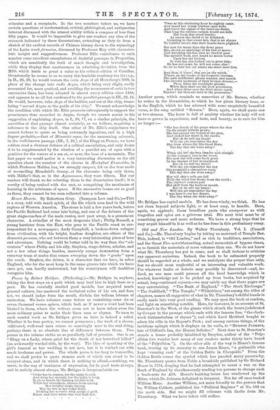Old and New London. By Walter Thornbury. Vol. L (Cassel/
and Co.)—Mr. Thornbury begins by taking us eastward of Temple Bar. This, indeed, is "Old London," and so rich in traditions, associations, and the Great Fire notwithstanding, actual memorials of bygone times, as to furnish the materials of more volumes than one. We do not know what Mr. Thornbury has yet to come, and so shall forbear to criticise any apparent omissions. Indeed, the book to be estimated properly should be regarded as a whole, and we anticipate the proper time only, lest we should seem neglectful of an interesting and valuable work. For whatever faults or defects may possibly be discovered—and, in- deed, no one man could possess all the local knowledge which is needed, knowledge not to be picked up from books, but acquired by actual, long-continued sojourn—we may safely say that these pages are very entertaining. "The Bank of ngland," "The Stock Exchange," "The Guildhall," "The Temple," "Whitefriars," are among the titles of chapters, names all suggestive of what in Mr. Thornbuty's skilful hands is easily made into very good reading. We may open the book at random, and light on something notable. Here, for instance, is an account of St. Dtmstan's in he West, of the giants which struck the hours (celebrated by Cowper in the passage which ends with the famous line, "the clock- work tintinnabulum of rhyme "), and which Lord Hertford bought to adorn his villa in the Regent's Park ; and among curious things, of the invidious epitaph which it displays on its walls, to "HUDSON Juni:aria, late of Clifford's Inn, the Honest Solicitor." Next door to St. Dunstan's stands a house probably inhabited by Drayton, author of the " Poly- olbion (we wonder how many of our readers under thirty have heard of the "Polyolbion "). On the other side of the way is Hoare's famous bank, tracing up its ancestry to one James Hoare, "a goldsmith who kept 'running cash' at the Golden Bottle in Cheapside." From fife Golden Bottle comes the symbol which has puzzled many passers-by. Mr. Thornbury quotes from Noble a broadside published by Sir Richard Hoare in 1754, denying that he had attempted to cause a run on the Bank of England by simultaneously sending ten persons to change each a bank-note for £10. Hare's banking house has swallowed up the Mitre, which Dr. Johnson delighted to frequent. Not far off once traded William Hone. Another William, not more friendly to the powers that be, William Cobbett, published his "Political Register" at No. 183 on the north side. But we might fill columns with thefts from Mr. Thornbury. What we have taken will suffice.


































 Previous page
Previous page